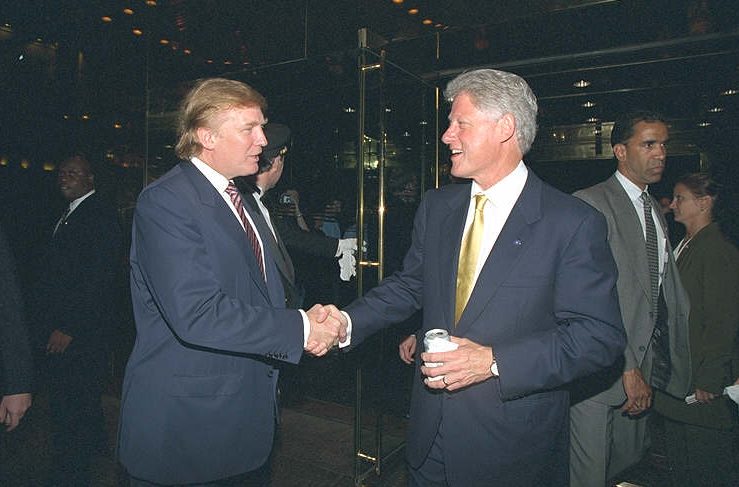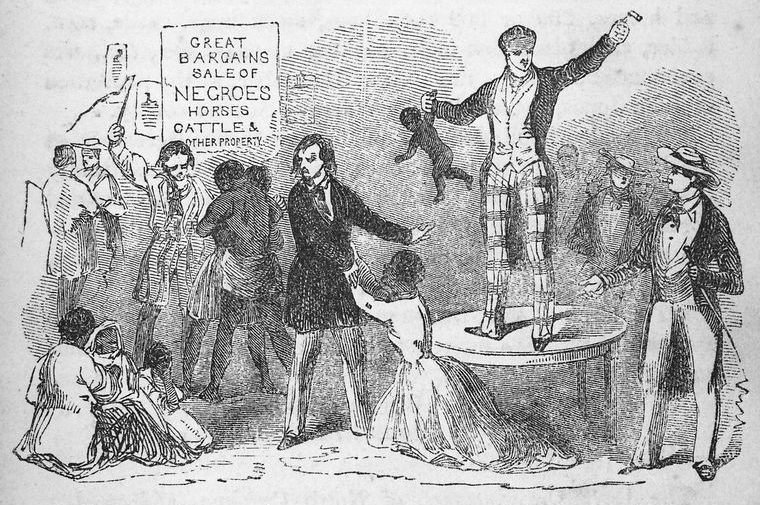Centrist Liberalism and the Myths of the American Past

We are now a full year into the Trump Administration, and a serious ideological challenge has yet to be leveled against the President. The political elites have not answered the President with firm oppositional leadership. Whether the Obamas, the Clintons, or the Bushes, the scions of centrist liberalism have not provided a genuine repudiation of Trumpism. Even as hundreds of thousands of immigrants face eminent deportation schemes; even as the pharmaceutical industrial complex profits from the addiction of the white working classes; even as American Indians fight to repel centuries of resource exploitation, former president Obama retains his “Audacity of Hope,” telling the poor, the working classes, and the disaffected that if they had to choose a time in which to be born, “Now is the greatest time to be alive.”
This obliviousness provides a case study in the arrogance of power as it posits the optimism of the liberal elite in contradiction to the pessimism of the masses, whose grim reality they do not have to experience. Trump, meanwhile, is marshaling a transformation of the country’s tax codes with the Tax Cuts and Jobs Act as well as restructuring the judiciary to tilt towards majoritarian and conservative rule. According to the New York Times, the President has appointed 18 appellate judge nominees, 14 of whom are men and 16 are white. Thus, the courts whiten even as the country’s demographics are browning–a case of diminishing returns for racial minorities hoping for a court of their peers.
Meanwhile, the liberal critics of President Trump appear to be trying to make omelets without breaking eggs. Rather than seizing this moment to transform the world that made Trump, the guardians of liberalism would rather tinker with it. As Ross Douthat of The New York Times has identified, a new breed of political actors are “speechifying anti-Trumpism…[but] unwilling to see how the Iraq War discredited both the Bushist and McCainian styles of right-wing internationalism.” Senators Jeff Flake and Bob Corker are now the face of what comprise Republican opposition within a liberal and center-right anti-Trump coalition, itself guilty of a collective indifference to the truths of America’s history. Take, for instance, former President George W. Bush’s narrative of a mythical past. If the adage that says “The great crime of Caesar was to have killed the [Roman] Republic,” Bush sees President Trump in a similar light: a likely destroyer of the Pax Americana, the 70-year period that cemented the U.S.’s role as the world’s hegemon. Although a cadaver cannot in earnest be assassinated, Bush sees the President ruling as if he were a dead man walking, warning him over potentially killing the postwar neoliberal order.
Speaking at a forum at the eponymous Bush Institute, his speech, the “Spirit of Liberty: At Home, In the World,” warns against an America undergoing an identity crisis due to “insolvency, economic stagnation, [and] anger about immigration.” This toxic mixture has led to disappointments and anger, fueling white America’s ethno-nationalist rage while threatening “to pull us apart,” which might “escalate into dehumanization.” In a rhetorical sleight, he stops short of specifying who is dehumanizing whom, tacitly suggesting a plague on both houses, left and right. This false equivalency cannot hold as we have clear markers of the ideological and systemic origins of Trump’s administration; they stem from a combination of racial capitalism and a winner-takes-all politics.
To be fair, Bush is only joining the company of a growing chorus of men and women who, upon Trump’s election, declared the end of Pax-Americana. Like them, he laments the decline of that order. Unlike most of them, he also offers a historical diagnosis with a “Call to Action.” The country, he maintains, must “recall and recover our own identity.” Thus, Bush’s response to President Trump’s rejection of the “forgotten dynamism that immigration has always brought to America,” is to encourage the nation to embrace the ghost of “Thomas Jefferson by accepting the ideal of human dignity found in the Declaration of Independence.” He also maintains that we are the heirs of James Madison, whose “understanding [of] the genius and values of the U.S Constitution” he suggests the nation ought to follow. With a distorted irony, the former president cannot surrender the trope of the “White men’s burden.” Furthermore, he paints a portrait of U.S. history as he wishes it were, not historically as it had been. He wants the nation to seek redemption from a slaveholder whose pen categorically declared “All men are created equal,” except women, Black people and American Indians. There can be no greater dismissal to the victims of herrenvolkian principles than raising the sinners of the nation’s founding above the altar of its salvation. Indeed, this disregard of the pains of the marginalized is among the sins of today’s political elites. As an antidote to Trump, they reach for a mythical past that urges others to follow the examples of the Virginian dynasty—the four of the first five U.S. presidents from Virginia—eliding over the fact that these problems were partly institutionalized by these men.
At the other end of that equation is the wholesale disregard of the abolitionists, suffragists, and Native American dissenters, whose voices never tired in their efforts to make possible a more just and ethically responsible world. As historian Manisha Sinha documents in her book, The Slave’s Cause, radical American democracy as we know it is uniquely the legacy of enslaved men, women, and their abolitionist allies who fought for a genuine multiracial society. These activists were the foot-soldiers who battled against the powerful “slave lobby,” which included Jefferson and Madison. Moreover, Bush elides over the truths of history to offer Trump a counter-narrative of American exceptionalism. As he put it, the republic’s “identity as a nation—unlike many other nations—is not determined by geography or ethnicity, by soil or blood.” In this counterfeit of American history, the former president conceals the origins of a nation predicated on the wholesale expropriation of Native American land to in turn keep African Americans in bondage longer than they have lived in freedom. Had Bush’s recollection of the nation’s creed held true, there would have been no need for a Civil War or the Reconstruction Amendments.

Contrary to the former president’s selective retelling of history, at the outset, racism, geography, ethnicity, soil, and blood helped enshrine a new nation dedicated to the proposition that “all men are created equal,” except Black people and women. Subsequently, the country became the largest and most powerful slave society the world has ever known. According to the historian-sociologist W.E.B Du Bois, it is this original sin, “The transportation of ten million human beings out of the dark beauty of their mother continent” which has stained America more than any other event in its history. As a willing actor in this “most significant drama of the last thousand years of human history,” Du Bois reasoned, the myth of the American past as a polyglot nation obscures the reality of recent events in Charlottesville, New Orleans, Baltimore, and other cities across the country, demonstrating how the past continues to tear into the social fabric of the nation.
If the crime of the founding generation of America was to preserve slavery, today’s elites are irresponsible in their urging to embrace an amoral past that cannot, in fairness, save the nation from descending into the abyss of herrenvolk democracy. Barely two decades into the twenty-first century, men like Bush continue to feign ignorance, failing to come to terms with the legacies of the radical humanitarianism of the abolitionists, suffragists, and the singular contribution of Black people to this nation: that the striving to a human right to citizenship rests in the most genuine democratic coalition ever assembled in the Atlantic world, the radical abolitionists and their allies, the Radical Republicans. To defeat the forces of Trumpism and contest its racist underpinnings, we must return to this coalition.
In his Souls of Black Folk, W.E.B Du Bois remarked that after racism derailed the democratic experiment of Reconstruction (1863-1877), “The Nation has not yet found peace from its sins.” Black people’s “disappointment [was] all the more bitter because the unattained ideal was unbounded save by the simple ignorance of a lowly people.” They watched as Reconstruction “came, and left the half-free serf weary, wondering, but still inspired.” The unending inspiration of the freedmen and women has fueled today’s Black Lives Matter movement. Activists are following the footsteps of the enslaved as the interlocutors of freedom who articulated the dreams of America’s democratic Reconstruction. It is in this singular gift of Black folk, which bequeathed the nation a tradition of radical hope, that we can earnestly reclaim a better America.
Copyright © AAIHS. May not be reprinted without permission.